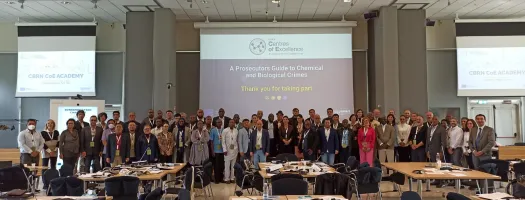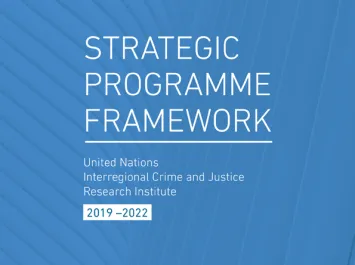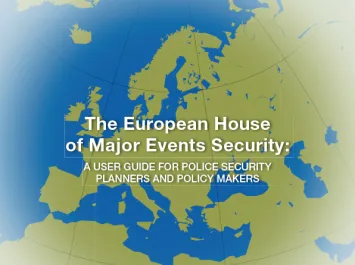Within the framework of the European Union Chemical Biological Radiological and Nuclear (CBRN) Risk Mitigation Centres of Excellence (CoE) Initiative, the United Nations Interregional Crime and Justice Research Institute (UNICRI) organized the CBRN CoE Academy, which took place at its headquarters in Turin from 26 to 30 September 2022.
The CBRN Academy was attended by the Heads of the Regional Secretariats; the National Focal Points (NFP) of the partner countries with their deputies and representatives; the UNICRI Regional Coordinators, and the experts of the European Union CBRN Risk Mitigation CoE Network. Most of the 63 partner countries of the EU CBRN CoE – which involves 8 regions of the world - participated in the Academy.
The envisaged training activity marked the first time that UNICRI had the opportunity to showcase and test a unique workshop and moot court simulation exercise, developed in line with the Prosecutor’s Guide to Chemical and Biological Crimes. The Prosecutor’s Guide was prepared and published by UNICRI in 2022, in close cooperation with the Organisation for the Prohibition of Chemical Weapons (OPCW) and the International Association of Prosecutors (IAP), and thanks to the generous funding of the EU CBRN CoE Initiative.
Following the publication of the Guide, several activities and training courses were developed and are now being implemented to provide prosecutors, judges, law enforcement and other relevant investigative agencies and stakeholders with guidance to support the successful investigation and prosecution of incidents involving chemical or biological agents. Both, the mock trial and the workshop, were successfully conducted during the CBRN CoE Academy.
The workshop tackled the real case example described in the Prosecutor’s Guide. The experts and facilitators of UNICRI developed the workshop in an effective way to engage participants in the exercise tasks and enhance their knowledge on chemical and biological crimes. Moreover, the workshop envisaged a video session, helping participants’ understanding of the case at hand and stimulating their critical skills and experience to solve the fictitious scenario. The knowledge and practical tools acquired during the training will help participants to strengthen investigation and prosecution capacities of chemical and biological crimes in their countries.
Following the workshop, the attendees also took part in the mock trial simulation exercise. They were able to apply the knowledge gained during the workshop to address the challenges involved in the simulation exercise. The mock trial dealt with essential topics to successfully investigate and prosecute a case such as, investigative intelligence, evidence preservation and disclosure, roles and responsibilities of prosecutors and other relevant stakeholders.
The participants found the training delivered during the Academy to be highly informative and useful. They expressed the desire to take part in extended versions of the activities, and work towards enhancing their capabilities with the help of UNICRI and other partner organisations.
With the funding received from the European Commission, UNICRI started the development of two additional training courses entitled “Building a CBRN Case for Prosecution” and “CBRN Interagency Coordination and International Cooperation”. These training courses will be complemented by e-learning modules, educational videos and pre-recorded webinars, in order to further boost prosecutorial an investigative capability of partner countries.



